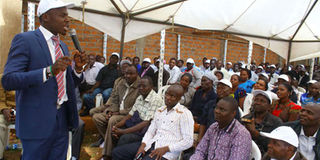Why age means nothing in leadership and politics

South Mugirango MP Silvanus Osoro, 29, addressing his supporters on August 17, 2017. PHOTO | BENSON MOMANYI | NATION MEDIA GROUP
What you need to know:
The current crop of the youth across the world could be classified as the most docile since time immemorial.
History is replete with facts that would make the current leadership demographics in the world retrogressive.
When one becomes an elected member of any House in Kenya at the age of 40 and below, stories about how he or she made it will abound in our media.
Mao started his revolutionary activity in China in his 20s and rose to the highest level of leadership.
"The world is yours, as well as ours, but in the last analysis, it is yours. You young people, full of vigour and vitality, are in the bloom of life, like the sun at eight or nine in the morning. Our hope is placed on you. The world belongs to you. China’s future belongs to you.”
These remarks were made by the former chairman of the China Communist Party, Mao Tse-tung, famously known a Mao Zedong, during a talk with Chinese students in Moscow on November 17, 1957.
These words still apply to present times, especially with regard to the youth of Kenya. But mere age does not guarantee any hope.
While many people are of the view that progressive communities are measured by the number of young people in leadership, history disputes this with facts.
It sounds simplistic to make pronouncements about how things are changing for the better simply because the youth are finding leadership positions.
INFLUENTIAL POSITION
Young people have always been at the forefront of all notable dispensations across history and across many jurisdictions. A serious study of the past gives us vital comparative knowledge to assess progress made over the years.
It is flattery to congratulate one simply because one occupies an influential position at a young age.
The current crop of the youth across the world could be classified as the most docile since time immemorial.
History is replete with facts that would make the current leadership demographics in the world retrogressive.
Presidents used to be younger. Even biblical kings were much younger. David, Solomon and Josiah are just a few examples.
LEADERSHIP
When one becomes an elected member of any House in Kenya at the age of 40 and below, stories about how he or she made it will abound in our media.
But how is this beyond the ordinary?
Mao started his revolutionary activity in China in his 20s and rose to the highest level of leadership.
Napoleon Bonaparte, the French military and political leader, became a national army general at the age of 24. He was an emperor at the age of 35 and took over from King Louis XVIII to become the king of Italy at the age of 36 after the fall of the Western Roman Empire.
Mao is remembered not by the age at which he started his revolutionary activity but by his deeds. He made the Chinese stand up from the embarrassing poverty that defined their society.
Napoleon is remembered by his mastery of military skills, not the age at which he shouldered responsibilities.
FALLACIES
Leadership must never be about age. If it was, the old would always be the leaders. On the other hand, if merely being young is an asset, the youth would always occupy the most important positions.
The simplistic repetition of fashionable fallacies on the topic should not change the real facts.
Leadership is a combination of many things and age is not one of them. Furthermore, no one is remembered in history by the age at which they took up responsibilities.
It is always on the basis of how they used their positions to influence the course of humanity.
Selection of leaders should also not have age as a requisite factor. It should neither be an asset nor a liability to carry the youth tag.
Whatever position, various leaders have different personalities and viewpoints. How they perform is an interplay between their personality and the nature of challenges they come across.
To everyone who aspires to join politics or occupy a position of influence, it is important to realise that for you to know the taste of tea, you must drink it.
POLITICS
If you want to learn politics, you must take part in it, not by being in the comfort of offices in the capital.
Knowledge is gained through direct experience. When preparing for great endeavours, we should take note of the qualities necessary for conquest — prudent judgment, attentiveness to shifting situations, boldness under fire, solidarity with your comrades-in-arms and full focus to the main assignment.
Preparation under such conditions is taxing and leaves little time and energy for luxury.
It follows that anyone interested in making a mark prepares well for it. It calls for some level of sacrifice that must be above the normal.
When an ambition is achieved, it behooves us to take it cautiously, knowing too well that success alone does not leave any legacy. Maintaining it is the enormous goal that calls for modesty, clarity of mind and firmness of character.
The youth eventually get old but deeds are timeless. Focus should, therefore, be on the kind of changes we effect.
Ndindi Nyoro is the Kiharu MP and an economist.




